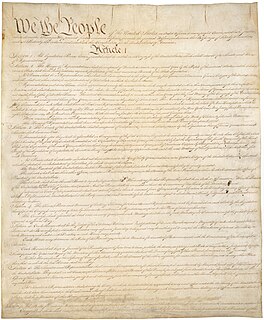
The Constitution of the United States is the supreme law of the United States of America. This founding document, originally comprising seven articles, delineates the national frame of government. Its first three articles embody the doctrine of the separation of powers, whereby the federal government is divided into three branches: the legislative, consisting of the bicameral Congress ; the executive, consisting of the president and subordinate officers ; and the judicial, consisting of the Supreme Court and other federal courts. Article IV, Article V and Article VI embody concepts of federalism, describing the rights and responsibilities of state governments, the states in relationship to the federal government, and the shared process of constitutional amendment. Article VII establishes the procedure subsequently used by the 13 States to ratify it. It is regarded as the oldest written and codified national constitution in force.

Article Five of the United States Constitution describes the process whereby the Constitution, the nation's frame of government, may be altered. Under Article V, the process to alter the Constitution consists of proposing an amendment or amendments, and subsequent ratification.

The Nineteenth Amendment to the United States Constitution prohibits the United States and its states from denying the right to vote to citizens of the United States on the basis of sex, in effect recognising the right of women to a vote. The amendment was the culmination of a decades-long movement for women's suffrage in the United States, at both the state and national levels, and was part of the worldwide movement towards women's suffrage and part of the wider women's rights movement. The first women's suffrage amendment was introduced in Congress in 1878. However, a suffrage amendment did not pass the House of Representatives until May 21, 1919, which was quickly followed by the Senate, on June 4, 1919. It was then submitted to the states for ratification, achieving the requisite 36 ratifications to secure adoption, and thereby go into effect, on August 18, 1920. The Nineteenth Amendment's adoption was certified on August 26, 1920.

The Convention for the Suppression of the Traffic in Persons and of the Exploitation of the Prostitution of Others was approved by the United Nations General Assembly on 2 December 1949 and entered into force on 25 July 1951. The preamble states:
"Whereas prostitution and the accompanying evil of the traffic in persons for the purpose of prostitution are incompatible with the dignity and worth of the human person and endanger the welfare of the individual, the family and the community"

The Little Entente was an alliance formed in 1920 and 1921 by Czechoslovakia, Romania and the Kingdom of Serbs, Croats and Slovenes with the purpose of common defense against Hungarian revanchism and the prospect of a Habsburg restoration. France supported the alliance by signing treaties with each member country. The rapid growth of German power caused its collapse in 1938, and it never went into wartime operation.

Article Seven of the United States Constitution sets the number of state ratifications necessary in order for the Constitution to take effect and prescribes the method through which the states may ratify it. Under the terms of Article VII, constitutional ratification conventions were held in each of the thirteen states, with the ratification of nine states required for the Constitution to take effect. Delaware was the first state to ratify the Constitution, doing so on December 7, 1787. On June 21, 1788, New Hampshire became the ninth state to ratify the Constitution, ensuring that the Constitution would take effect. Rhode Island was the last state to ratify the Constitution under Article VII, doing so on May 29, 1790.
The Radio Act of 1912, formally known as "An Act to Regulate Radio Communication", is a United States federal law which was the first legislation to require licenses for radio stations. It was enacted before the introduction of broadcasting to the general public, and was eventually found to contain insufficient authority to effectively control this new service, so the Act was replaced and the government's regulatory powers increased by the passage of the Radio Act of 1927.
Hours of Work (Industry) Convention, 1919 is an International Labour Organization Convention.
The Convention concerning Wages, Hours of Work on Board Ship and Manning is a convention of the International Labour Organization originally drafted in 1946 and revised conventions in 1949 and 1958, none of which entered into force.
Hours of Work and Rest Periods Convention, 1939 (shelved) is an International Labour Organization Convention.
Hours of Work and Rest Periods Convention, 1979 is an International Labour Organization Convention.
Weekly Rest Convention, 1957 is an International Labour Organization Convention.

The Working Conditions Convention, 1991, officially the Convention concerning Working Conditions in Hotels, Restaurants and similar Establishments is an International Labour Organization Convention adopted in 1991 during the 78 International Labour Conference.

The Virginia Ratifying Convention was a convention of 168 delegates from Virginia who met in 1788 to ratify or reject the United States Constitution, which had been drafted at the Philadelphia Convention the previous year.
Work in Fishing Convention (2007) C 188, was adopted at the 96th International Labour Conference (ILC) of the International Labour Organization ILO in 2007. The objectives of the Convention is to ensure that fishers have decent conditions of work on board fishing vessels with regard to minimum requirements for work on board; conditions of service; accommodation and food; occupational safety and health protection; medical care and social security. It applies to all fishers and fishing vessels engaged in commercial fishing operations. It supersedes the old Conventions relating to fishermen.

The Maritime Labour Convention (MLC) is an International Labour Organization convention, number 186, established in 2006 as the fourth pillar of international maritime law and embodies "all up-to-date standards of existing international maritime labour Conventions and Recommendations, as well as the fundamental principles to be found in other international labour Conventions". The other "pillars are the SOLAS, STCW and MARPOL. The treaties applies to all ships entering the harbours of parties to the treaty, as well as to all ships flying the flag of state party.

The Convention on Domestic Workers, formally the Convention concerning Decent Work for Domestic Workers is a convention setting labour standards for domestic workers. It is the 189th ILO convention and was adopted during the 100th session of the International Labour Organization. It entered into force on 5 September 2013.
The International Convention for the Suppression of the Traffic in Women and Children is a 1921 multilateral treaty of the League of Nations that addressed the problem of international trafficking of women and children.

Aloysius Larch-Miller was a suffragette and women's rights advocate from Oklahoma. She was most known for a debate speech made days before her death which resulted in passage of a proposal to ratify the Nineteenth Amendment. She was posthumously inducted into the inaugural group of women honored by the Oklahoma Women's Hall of Fame.
The right to rest and leisure is the economic, social and cultural right to adequate time away from work and other societal responsibilities. It is linked to the right to work and historical movements for legal limitations on working hours. Today, the right to rest and leisure is recognised in the Universal Declaration of Human Rights, the International Covenant on Economic, Social and Cultural Rights, the Convention on the Rights of the Child, and in many regional texts such as the African Charter on the Rights and Welfare of the Child.